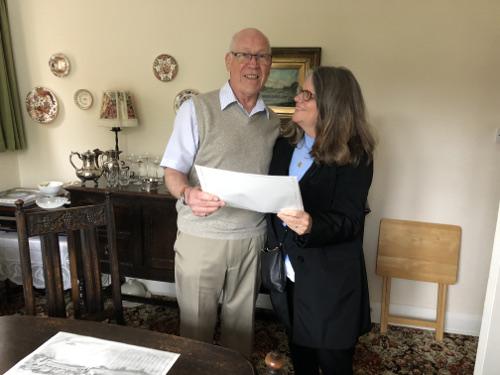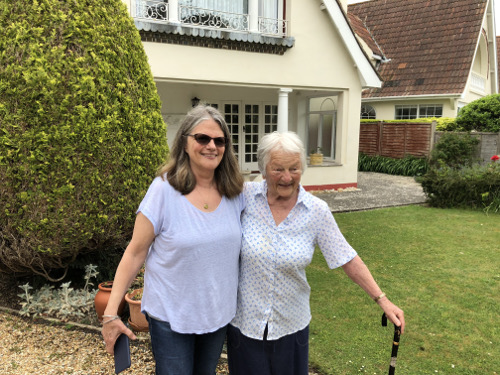Hands Across The Ocean
In 2019 I met with American author Deborah Heiligman, who was working on a new children’s book about the sinking of the City of Benares in World War II. It was lovely to meet her and exchange information on this fascinating story and she’s now been kind enough to write a blog for us talking about her research and what drew her to the City of Benares.

Deborah with John Baker, child survivor of the City of Benares sinking
Seventy-eight years ago this week, the last survivors of the SS City of Benares were rescued and taken aboard the H.M.S. Anthony. Among those survivors were six little boys, kept alive, almost single-handedly, by a 41-year-old music teacher, a children’s escort. Also on that lifeboat were three dozen Lascar sailors, one private passenger, a Catholic priest, who was also an escort, some Royal Navy crew, including a young man from Liverpool, and thirty-six Indian sailors. Some of the passengers were barely alive; yet all but one lived. The survival of these 46 people, crammed into a small lifeboat, is a testament to the power of community and cooperation.
This story of the torpedoing of the City of Benares, with the death of so many children, is an unthinkable tragedy. But like the story of Lifeboat 12, beacons of humanity shine through at every turn. These lights have illuminated my life for the past four years. In the fall of 2014, sitting in a restaurant in New York City, my editor, Laura, showed me a photograph on her phone. I’d just handed her a draft of a book about Vincent van Gogh and his brother Theo, and we were talking about what I would write next. The picture on Laura’s phone was of a custom-made lifejacket, child-sized. She had taken the photograph nine years earlier, at an exhibit at the Imperial War Museum (IWM) in London, and couldn’t get it out of her head. "Maybe you want to write about this next? Just google City of Benares,” she said to me in such a casual, offhand way that I knew she had confidence that I would connect to the story. I rode the subway back to my apartment and within an hour I was hooked. What a story. The custom-made lifejacket ordered by a mother reluctant to send her oldest child away, a jacket that saved her 11-year-old son’s life, was just the beginning.
So, while finishing Vincent and Theo (it would take another two years), I researched the City of Benares. Thanks to the Imperial War Museum’s online resources (especially interviews with most of the British children who survived) and to the dedication of people like Jennifer Robertson at the Maritime Museum (who wrote blog pieces about the event), records ordered from archives in Glasgow, and research librarians at the British Library, and a few books, I learned most of what I needed to know just sitting in my home office in New York City. But last winter I discovered that two survivors were still alive. As keeps happening with this book, a stranger helped me. I Skyped with Sonia Bech Williams, who then connected me to John Baker. After those conversations I knew I had to cross the pond. And that former stranger, now a friend, Beverly, helped me make the plans.
I’d been to England before; in fact fourteen years ago my husband and sons and I lived in London for seven weeks. But this two-week trip connected me to England irrevocably. (My husband teased me that I stopped sounding American within one day!) The trip’s magic started with my “interrogation” at Heathrow upon arriving. My husband and I shuffled off the plane, tired and eager for food and sleep. The woman asked the usual question, her tone of voice and blank face betraying her ennui: “What brings you here? Work or pleasure?” “Work,” I told her. She asked what kind. “I’m writing a book, and doing research here.” Her face showed a little more interest. “What is the book about?” “Well, it’s a children’s book, actually, about an incident in World War II.” Now I had her full attention. As I explained about the S.S. City of Benares, and the 100 children on board, 90 of whom were in the CORB (Children’s Overseas Reception Board) program, this woman went from officially bored to captivated. The line of passengers behind us got longer. She didn’t want to let us go—but in a good way! “When can I read it?” she asked me. Sooner if you let me get to my hotel and get a good night’s sleep, I did not say.
As we bid her good-bye, I knew my trip had been blessed. Throughout our journey people showed us kindness, gave us help and advice. (Your TUBE workers actually HELP tourists! Amazing.) In London, in addition to doing more research at the IWM, we also visited St. Jude’s Church, where I saw the mural depicting the heroism of Michael Rennie, the then-vicar’s son, and met the wonderful vicar, Rev. Alan Walker. He wrote about the visit on his blog.

Deborah Heiligman with Sonia Bech Williams, another child survivor of the sinking of the City of Benares, outside Sonia's childhood home.
Meeting the two survivors, Sonia Bech Williams, and John Baker, was everything I had hoped for, and more. Talking with them changed not only the book, but my life. I came to understand--as much as is possible without having experienced it--what it was like to go through a horrific night and survive, as Sonia had. And sadly, I now have a great empathy for John Baker, and the tragedy of being on the ship and losing his brother. I count both Sonia and John as my friends now, too. We ended the trip in Liverpool. I was eager to meet Jennifer Robertson, of the Maritime Museum, who had written extensively about the story, and already had been a great help to me. Jen shared material I hadn’t seen, I told her some things I had learned, and I asked her many questions--and continue to do so via email. I venture to say if I don’t ruin it by leaning on her too much, we are friends, too. On what was supposed to be our last day there, my husband and I walked along the docks and as far down to the river as we could go. We ran into a couple who grew up in Liverpool, and, typical of this trip, helped us. When I mentioned what I was doing, they told us about their city, and shared their World War II connections. And told us: You should take the Mersey Ferry to Birkenhead to see a German U-boat in person. I hadn’t known it was there! So of course we changed our plans so we could cross the Mersey and see the U-boat. As I write this, I am filled with gratitude for the sense of community and comradery across the pond.
My book should be published a year from now. I hope that I’ll be able to visit with you again—here and in person.
